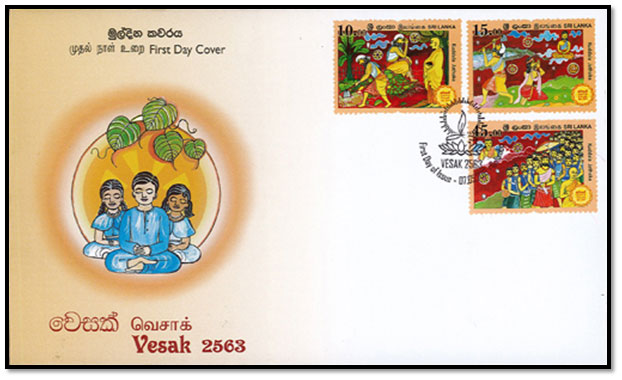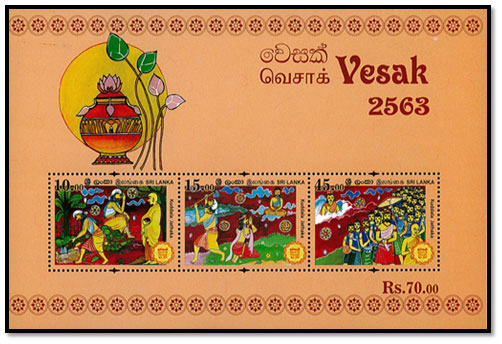

Home/Active Page

The Philatelic Bureau of the Department of Posts has Issued three stamps in the denomination of Rs.10.00, Rs.15.00 and Rs.35.00 and a Souvenir sheet on 07th May, 2019 to commemorate the Vesak 2563.
| Date of Issue | 07th of May 2019 |
| Denomination | Rs.10.00, Rs.15.00 & Rs.45.00 |
| Catalogue No: | Rs.10.00- CSL 2323 Rs.15.00- CSL 2324 Rs.45.00- CSL 2325 |
| Stamp Designer | Samanthi Meeriyagalle. | Stamp Size: | 41mm x 30mm |
| Sheet Composition: | 20 stamps per sheet |


The Philatelic Bureau of the Department of Posts has issued three stamps in the denomination of Rs.10.00, Rs.15.00 and Rs.35.00 and a Souvenir sheet on 07th May, 2019 to commemorate the Vesak 2563.
'Akusala Duralamu – Kusala wadamu' (let's eradicate sin and enhance merit) is the theme of this year's (2019) national Vesak Day celebrations. Lobha, dvesha and moha, Sanskrit words that are usually translated as "greed," "hate" and "ignorance," are called the Three Unwholesome Roots, which are considered the source of all evil and negative mental states. Alobha, advesha and amoha, generally translated as 'generosity, loving kindness and wisdom,' stand in opposition to the the Three Unwholesome Roots.
These are bolstered by the Four Sublime States, i.e. Love or Loving-kindness (metta,) Compassion (karuna,) Sympathetic Joy (mudita) and Equanimity (upekkha.) Virtues cleanses the human mind. It relaxes a person and assist in understanding the true nature of the world. A person benefits greatly when he or she eradicates sinful thought and cultivates virtuous thoughts.
Kuddala Jataka story provides a prime example of the benefits of a virtuous mind and thus was selected to be depicted in the stamps.
The Bodhisatta was once born into a caste that sells fruits and vegetables. Since is only possession was a spade (kuddala) he was known as Kuddala Pandita (Spade Sage). The Bodhisatta used the spade to till the land, plant fruits like pumpkin and watermelon and sell them to make a living. His was a sorry life, for, save only that one spade, he had nothing in the world.
After a while the Bodhisatta grew tired of lay life and decided to become a monk. He hid his spade and became a reclusive monk. However he still could not forget about his spade, grred rose, and six times thoughts of his spade drew him back to the lay world.
The Bodhisatta realized that unless he gets rid of the spade for good, he will be again drawn into the lay world. Thus in the seventh time, he took the spade to the river, whirled the spade thrice round his head by the handle and threw the spade into the river. He shut his eyes tight as he-did so, fearing that if he saw where the spade fell, he should come back and fish it out again. After throwing it into the river,the Bodhisatta shouted for joy, a shout like a lion’s roar,—"I have conquered! I have conquered! I have conquered!"
The Bodhisatta said, one can win a thousand battles, but the greatest victory is overcoming your desires. 'I have challenged the lobha (greed) that is inside me and overcame my desires,' the Bodhisatta told the king. The Bodhisatta added that defeating enemies is not an everlasing victory and that even winning in battle thousands or hundreds of thousands of times does not make one an ultimate warriors. Such victories are vain. Only the person who can sever the ties that bind him or her to the mortal world can be considered an ultimate warrior, the Bodhisatta said.
After hearing the reason for the joyous cries of the Bodhisatta, the king of Benares resolved to join Kuddala as an anchorite, as the lust for royal dominion passed away from him. His entourage also joined the king of Benares. After hearing the news, the people of Benares accompanied them. After learning of this, the Sakka sent Vissakamma, the architect of the Devas to prepare quarters for him. Vissakamma was instructed to go to the Himalayas, and to erect monasteries for them in the Himalaya.
The Bodhisatta after arriving at the monasteries erected by Vissakamma, ordained himself first and then ordained the king and his entourage. After meditating he attained the brahmavihārās, a series of four Buddhist virtues and the meditation practices made to cultivate them. He was born in the Brahma world after death. Anyone who had attended to him while he was alive, they were reborn in heaven.
The king of Benares was Ananda Thero, the primary attendant of the Buddha and one of his ten principal disciples. The Buddha’s followers were the followers of the King and the spade sage was Buddha himself.
All rights received. All right to identify the Department of Posts as the Author and designer of this Bulleting has been asserted in accordance with the Copyright, Design and Patents Act 1988.No part to this publication may be reproduced, stored in or introduced into a retrieval system, or transmitted in any form or by and means (electronic, mechanical, photocopying, recording or otherwise) without the prior permission from the publisher. Any person who does and unauthorized act in relation to this publication may be liable to criminal prosecution and civil claims for damages.